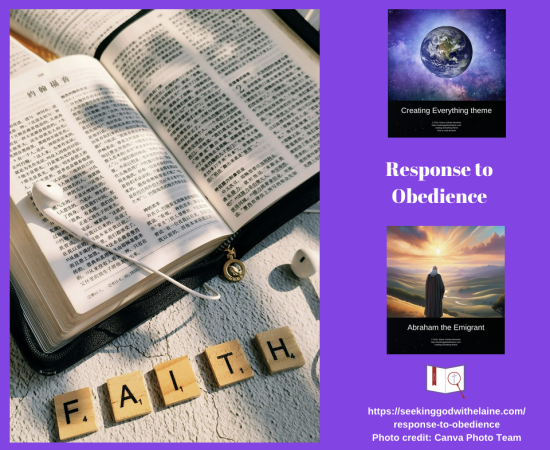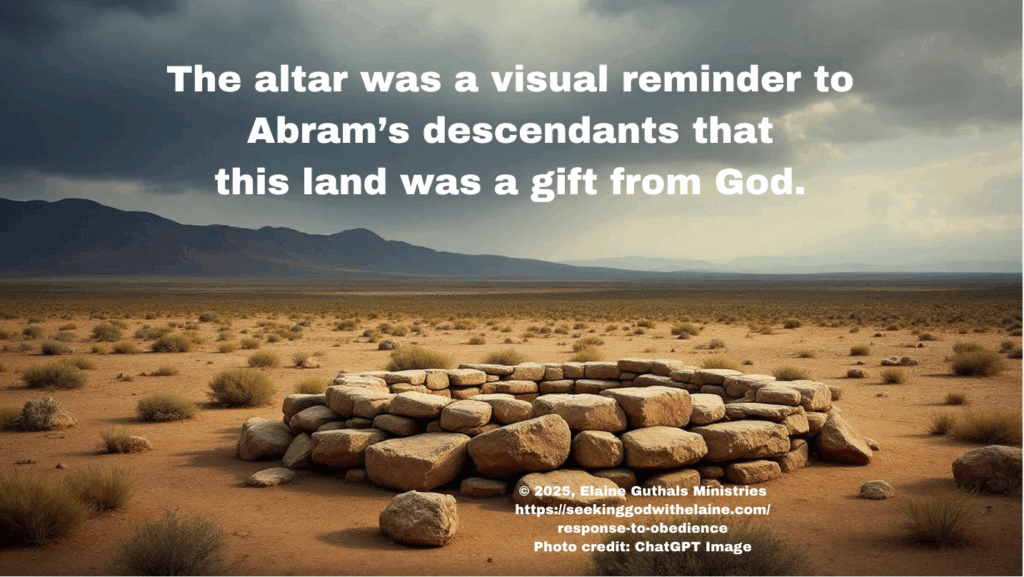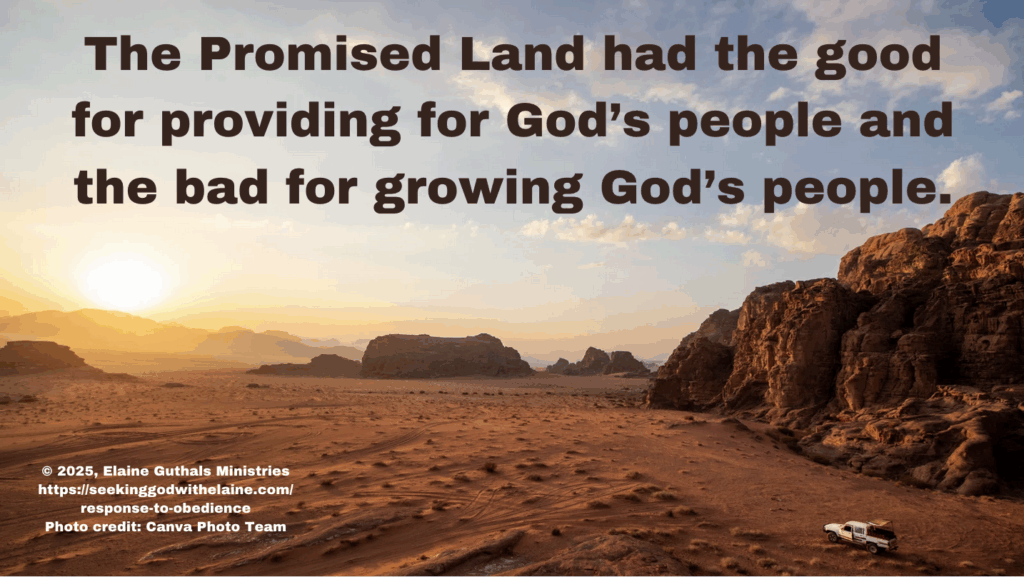Our band of travelers have reached their destination in Canaan. This devotional reading looks at God extending the blessings of the covenant and Abram’s response to that.
Nuggets
- Genesis 12: 7 was the first time the promise of land was involved.
- Throughout Abram’s lifetime, he built altars to memorialize the mercies of God.
- Abram didn’t stay put at Shechem.

Abram, Sarai, and Lot have come the long way from Haran. They land at Shechem.
How is God going to reward Abram’s obedience? How is Abram going to respond?
Let’s check it out.
Let's Put It into Context
To read devotions in the Creating Everything theme, click the button below.
Devotions in the Abraham the Emigrant series
God Extended the Blessings of the Covenant
“Then the Lord appeared to Abram and said, ‘I will give this land to your descendants.’ And Abram built an altar there and dedicated it to the Lord, who had appeared to him” (Gen. 12: 7 NLT)
Genesis 12: 7 was the first time the promise of land was involved.
Remember that God entered into a covenant with Abram. I would say that we need to add this to the blessing section of the covenant.
- Covenant established (Gen. 12: 1-3)
- Blessings of the covenant (Gen. 12: 7; Gen.13: 14-17)
- Sign of the covenant (Gen. 15: 1-21)
- Acceptance of the responsibilities of the covenant 17: 1-27)
- Promise of the covenant (Gen. 18: 9-15).
When Abram left Haran, he wasn’t promised land of his own. In fact, when I got the list above, nothing was said about these verses.
But I think they are important. Land is a part of the promise to Abram.
We’ll wait to have a discussion about the land when we get further in.
Abram Built an Altar
Throughout Abram’s lifetime, he built altars to memorialize the mercies of God.
We have had minimal glimpses of altars previously in Genesis. We saw the sacrifices of Cain and Abel – which had to have been done on an altar even though it doesn’t say (Gen. 4: 3-4). We also know Noah built an altar as he existed the ark and sacrificed a slew of animals (Gen. 8: 20).
We aren’t told Abram built an altar in Haran. Personally, I don’t think he did.
Abram built an altar to exclusively honor God. He wanted to show his thankfulness for the promise of provision. The altar was a visual reminder to his descendants that this land was a gift from God.

Kalisch put the location of the altar into perspective. He wrote,
“The place of the ancient tree, which so long witnessed superstitious and cruel rites, was hallowed by a Divine vision, and converted into a sacred spot; and at the side of the idolatrous temple rose an altar dedicated to the God of heaven and earth.”
Resource
Just to keep it straight in my mind, we know of four altars Abram/Abraham built.
- Shechem: Abram built his first altar upon entering the land of Canaan (Gen. 12: 7).
- Bethel: He constructed an altar between Bethel and Ai as a place of worship (Gen. 13: 3).
- Hebron: Abram built an altar in the region of Mamre, near Hebron (Gen. 13: 18).
- Mount Moriah: Abraham prepared an altar for the sacrifice of Isaac, demonstrating his faith (Gen 22: 9).
Yes, Abram kept building altars because they were in different places. He wanted something where he was.
More importantly, Abram kept building altars because He kept worshiping God whatever the circumstance.
But Abram was taking a chance, wasn’t he? The Canaanites were not followers of God. They had their own gods they followed.
They could have disagreed strenuously – and probably painfully for Abram. Abram built them anyway.
Isn’t that what we are supposed to do? We are supposed to be in the world but not of the world.
Yeah, Abram had Sarai and Lot – who had issues of their own. I bet he felt alone a lot of the time.
So, why did Abram build this altar? Since he just finished his journey, I bet his mind was going all the way back to Ur. How different his life would have been then
God is a more hands-on God than those false idols. Abram wouldn’t have seen that as an intrusion. He had just traveled however many miles under God’s leadership He knew without a doubt that he c0ould rely on Him.
Abram now knew what dependence on God really was. It wasn’t slavery. It wasn’t subjugation. It was a relationship with the all-knowing, all-powerful Sovereign God. It was being the recipient of His mercy.
Hasting said something that got me thinking. How did God view this altar? He didn’t see it as just a pile of stones.
God saw, as Hastings said, “… ABRAHAM’S READINESS TO CONSECRATE HIMSELF ENTIRELY TO GOD.” He saw Abram’s heart. It was built because of character, mindset, and purpose.
Resource
Abram worshiped God where he was, in whatever circumstance he was in. He left a visible sign of the highs and lows of his journey.
Ness used God’s Word to tell us how we are priests, have altars, and Who sanctifies the sacrifice.
- “And you are living stones that God is building into his spiritual temple. What’s more, you are his holy priests. Through the mediation of Jesus Christ, you offer spiritual sacrifices that please God” (I Pet. 2: 5 NLT).
- “He has made us a Kingdom of priests for God his Father. All glory and power to him forever and ever! Amen” (Rev. 1: 6 NLT).
- “We have an altar from which the priests in the Tabernacle have no right to eat” (Heb. 13: 10 NLT).
- “And I will give you a new heart, and I will put a new spirit in you. I will take out your stony, stubborn heart and give you a tender, responsive heart” (Ezek. 36: 26 NLT).
- “How blind! For which is more important—the gift on the altar or the altar that makes the gift sacred?” (Mt. 23: 19 NLT).
So, our heart is the altar. It has to be visible to worldview people.

Isn’t that what Jesus said? We need to be lights on a hill.
- “You are the light of the world — like a city on a hilltop that cannot be hidden. No one lights a lamp and then puts it under a basket. Instead, a lamp is placed on a stand, where it gives light to everyone in the house. In the same way, let your good deeds shine out for all to see, so that everyone will praise your heavenly Father” (Mt. 5: 14-16 NLT).
- “… Live clean, innocent lives as children of God, shining like bright lights in a world full of crooked and perverse people” (Phil. 2: 15 NLT).
- “Be careful to live properly among your unbelieving neighbors. Then even if they accuse you of doing wrong, they will see your honorable behavior, and they will give honor to God when he judges the world” (I Pet. 2: 12 NLT).
After That
“After that, Abram traveled south and set up camp in the hill country, with Bethel to the west and Ai to the east. There he built another altar and dedicated it to the Lord, and he worshiped the Lord. Then Abram continued traveling south by stages toward the Negev” (Gen. 12: 5-9 ESV)
Abram didn’t stay put at Shechem.
Sometimes, God moves us from the farm to city. Sometimes, He moves us from Illinois to Missouri. Sometimes, God moves us from the USA to another country. (No, I am not planning on moving again.)
When God says, “Go,” we need to go.
There are all kinds of different reasons. The generic answer is God moves us through the stages of our lives.
As painful as it might be, we don’t want to skip a stage. We don’t want to miss those lessons.
I like what Hughes said. He wrote, “Faith [causes] souls to adhere unto and make profession of the true religion of God in all places; faith is never ashamed of God, truth, worship, or way.”
Resource
If we haven’t made a true profession to God, the stimulant isn’t faith – it is something else. Only genuine faith results in salvation.

Our goal must be set on obeying God. That means we have to distance ourselves from engaging in current, worldly events.
Making the Connections #1
Robertson put Genesis 12: 7 into perspective. It didn’t have to do with Abraham.
It had to do with Moses. Robertson believed Moses was writing this record right before the Israelites made the exodus from Egypt.
Resource
Wouldn’t that have given the Israelites a boost before the start of their journey?
Hey, Abraham (the name by which they knew the man) had a journey of his own. He took it with faith and obedience — just like you should. His destination was Canaan — which is your destination, too — it’s called the Promised Land.
Why is it the Promised Land? God promised it to Abram as a permanent possession.
- Then the Lord appeared to Abram and said, ‘I will give this land to your descendants.’ And Abram built an altar there and dedicated it to the Lord, who had appeared to him” (Gen. 12: 7 NLT).
- “After Lot had gone, the LORD said to Abram, ‘Look as far as you can see in every direction — north and south, east and west. I am giving all this land, as far as you can see, to you and your descendants as a permanent possession’” (Gen. 13: 14-15 NLT emphasis added).
- “Then the LORD said to Abram, “You can be sure that your descendants will be strangers in a foreign land, where they will be oppressed as slaves for 400 years. But I will punish the nation that enslaves them, and in the end they will come away with great wealth. (As for you, you will die in peace and be buried at a ripe old age.) After four generations your descendants will return here to this land, for the sins of the Amorites do not yet warrant their destruction’” (Gen. 15: 13-16 NLT emphasis added).
What were they doing? They were fixing to return.
Sure, they didn’t know they were going to become the Wilderness Wanderers.
- They probably heard the “… they will come away with great wealth” (Gen. 15: 14 NLT) part and thought they would be millionaires.
- They probably heard the it’s-a-permanent-possession part and think there were going to waltz right in and take possession.
Their misinterpretation of what God was going to do didn’t keep God from doing what He was going to do.

But this was a great pep talk for them as they were preparing the first Passover meal. The uncertainty and drama of the exodus may have been minimized by the expectation of the fulfillment of the promise.
Making the Connections #2
How did Abram’s journey follow our journey to salvation? Temple told us.
- We have to stop fighting the promptings of the spirit and go forth into a relationship with God.
- That means we abandon the road leading to the wide gate and enter the narrow gate towards grace.
- We let You direct every aspect of our lives. We make Your principles our own.
- We look to You in the good times and, especially, in the bad times — whatever the time frame.
- We successfully complete the journey we start.
Resource
Remember, Ur to Haran was an unsuccessful journey because the destination was Canaan. Haran to Canaan was the successful journey.
Trumbull gave an explanation as to why Ur to Canaan was not have been successful. He wrote,
“Terah’s journeying was only in search of pasture and an abode. So he dropped his wider scheme when the narrower served his purpose. It was an easy matter to go from Ur to Haran. Both were on the same bank of the Euphrates. But to cross the broad, deep, rapid river was a different thing, and meant an irrevocable cutting loose from the past life. Only the man of faith did that.”
Resource
Whether or not those excuses are the ones Terah used, ooo baby, do some use them today!
- Isn’t it the going gets rough, and the weak-in-faith people stop going?
- Why should we go on if we’ve gotten what we want, even if we did say our end goal was exactly the same as God’s?
- Give up everything and everyone from our past life? That is unthinkable for You to even ask us.
We would call these the lukewarm Christians. They aren’t cold because they think they have given their life to Jesus as their Savior and Redeemer. But they aren’t hot because they quit, their motivation is wrong, and they hold on to sin.
Look at it this way. The starting immediately matters, but the enduring to the end is just as, even maybe more, important. “But the one who endures to the end will be saved” (Mt. 24: 13 NLT).
Making the Connections #3
Have you ever thought about why God chose Palestine to be the Promised Land? It was described as a land of milk and honey, right, so, it would be a wonderful piece of land.
Ummm. Not according to Dykes. He wrote,
“Another characteristic which qualified Palestine to be a training ground for the Hebrews was this: that it combined to an unusual degree high agricultural fertility with exposure to sudden and severe disasters.”
Resource
It had the both – fertility and disasters. The Promised Land had the good for providing for God’s people and the bad for growing God’s people.

In other words, the Hebrews and later the Israelites that lived in this land could make a living off of it, but they would also be tested to ensure their reliance was on God.
Isn’t that what sanctification is all about?
How Do We Apply This?
- Worship God by speaking in His name.
Resource
Father God. We pray that You find us as obedient as Abram. We give You our hearts as an altar. We are the living sacrifice. We praise and honor You. Amen.
What do you think?
Leave me a comment below (about this or anything else) or head over to my Facebook group for some interactive discussion.
If you don’t understand something and would like further clarification, please contact me.
If you have not signed up for the email providing the link to the devotions and the newsletter, do so below.
If God has used this devotion to speak with you, consider sharing it on social media.